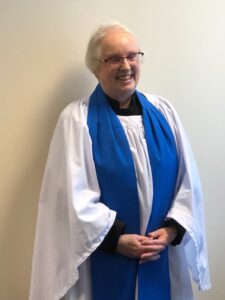
My journey to becoming a Reader in the Church of England is a testimony to the incredible patience of God.
I was admitted and licensed on a sunny 13th October during a joyful Morning Eucharist in Warsaw. Preparing to meet Archdeacon Adèle at the airport the day before, I found myself thinking back to Saturday 12th October 1985, when I myself first landed in Warsaw to take up a British Council teaching post, in Gdańsk, “my plans” for that academic year having fallen through a couple of months earlier. Warsaw had then been bleak and rather grim and I had felt very much an alien. However, wondering what I had let myself in for, I had recalled an October day, earlier still, when, as a fresher at university, I had joined, mainly out of curiosity, a prayer group for communist countries. Be careful what you pray for!
While marriage and a family kept me anchored in Poland, I lived in Gdańsk for the next thirty years as an “isolated Anglican,” participating in public worship in a different language and in a different, distinctively Polish, tradition. God, in his mercy, kept me throughout, yet the situation was not ideal. I was not starving, but I was hungry.
It was against this background that God called me to become a Reader in the Church of England and it was both unexpected and clear. A few years ago, when signing the “patient’s charter” on admission to hospital for surgery, I was struck by its guarantee of a right to pastoral care in the patient’s own faith tradition. Where could an Anglican find this in Gdańsk, or anywhere in northern Poland come to that? Where indeed?
It was immediately apparent that this was something that I could not drift into. It would require authorisation, Gdańsk is geographically remote from Warsaw, where the Anglican chaplaincy had finally been reinstated in 1996. Rev. David Brown, the Chaplain, with whom I had had no previous contact, answered my phone call almost as if he had been expecting it and was eager to explore whether now was the time for services to be held in Gdansk. I have since become aware that his vision is part of a wider recognition of a role for “missional readers,” who may be embedded in a particular geographical area or community.*
The fellowship of the wonderful people who have found their way to the small but growing church in Gdańsk and friendships made elsewhere in Poland and in the Diocese in Europe have been a great joy. However, I hope I will never forget the “isolated Anglicans” as I go forward. I was one myself.
While training in such an environment requires self-discipline, it has, in my case, been a feast after a long fast. I also began to check some of the habits of a lifetime! The Church does not need too many more “opinions” these days. I would argue that the training of a lay minister is necessary to form the habit of making prayer and reflection on Scripture the starting point for a response. I’m not the person I was a few years ago. This is, of course, work in progress and my prayer is, in the words of Charles Wesley, “Finish, then, thy new creation!”
Archdeacon Adèle said, accurately, after my licensing, “You’re up and running.” I sometimes feel I have ground to make up, although I’m mindful that running, especially at my age, risks tripping and falling if I do not look where I’m going. Yet there has been no “lost time.” God has just been incredibly patient.
*See, for example, Exploring Missional Reader Ministry by Liz Shercliff (Grove Booklet MEv123, 2018)
